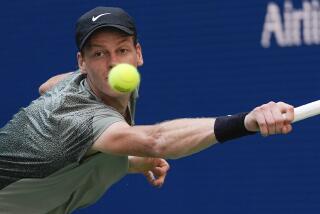Comeback Trail a Rocky Road for Two Veterans
- Share via
MELBOURNE, Australia — While the rest of his more sensible colleagues were making every effort to retreat from the sun and the pressure of center court, Michael Chang reveled in his victorious return to a tennis court Tuesday.
The third-seeded Chang began his Australian Open campaign with a tense victory over Kenneth Carlsen of Denmark, 6-3, 7-6 (7-2), 5-7, 6-3.
When he knocked in an ace on match point, Chang retired to the shadow of a courtside umbrella and hung his head in relief after three hours on the court.
Also relieved was Andre Agassi, fresh from the challenger circuit. In a match played on an overflowing outside court, Agassi, who like Chang had a miserable 1997, opened against Marzio Martelli of Italy and struggled to a 3-6, 7-6 (7-3), 6-2, 6-2 victory.
“To be quite honest, in a very strange fashion, I felt a little nervous out there,” Agassi said. “I played cautiously and I didn’t find my rhythm. When I did, I began to play my own game--dictating.
“I feel like I’m right there, ready to step it up. If you’re going to do it, you’ve got to do it now. My shots are there. It’s going to happen.”
Even with his diminished ranking of No. 87, it was a puzzlement that such an experienced player would have as much trouble with a qualifier. Martelli, ranked No. 133, went into the match with a 13-16 career record and having participated in only three Grand Slam tournaments. Agassi has won three Grand Slam tournament titles, including the Australian Open in 1995.
Given the circumstances, Martelli rose to an amazing level, especially in the second set. In the second game Agassi needed all of his famous skills at service return to stay in each point. The game went to deuce 11 times, Agassi had six break points and Martelli had seven aces, one on a second serve. He had 25 aces in the match.
The Italian held but Agassi prevailed in the tiebreaker--despite a double fault--to win the set and begin a tepid comeback.
Agassi’s rustiness was apparent. He had 48 unforced errors and he converted on only five of 28 break-point chances.
Usually one of the most consistent players on the tour, Chang’s game melted down at the end of last year. He lost seven of his last eight matches and played so badly during the Davis Cup final that he was dejected and deeply pessimistic.
His performance at Melbourne Park on Tuesday gave him marginal cause for optimism. The match produced a prodigious number of unforced errors. Carlsen had 64 and Chang had 45.
Meanwhile, the tournament’s top-seeded players made it safely out of the first round. Pete Sampras advanced Monday, defeating Sjeng Schalken, 7-5, 6-4, 6-2.
Martina Hingis advanced Tuesday, defeating Wiltrud Probst, 6-1, 6-2.
Sampras appeared bright and fit, saying the calf injury that ended his season so sourly last year is completely healed. He reiterated his intention to concentrate on the four Grand Slam events and scale back the rest of his tennis commitments.
“The reason I’m playing this game is for the majors,” he said. “What’s getting me motivated is moments like this. I do like my schedule this year. I feel pretty fresh and motivated to play well this year; I’m trying to break some records. I’m trying to win majors, and I have a chance here, hopefully, to do that.”
Two seeded men were defeated Tuesday, though neither loss was too surprising. Although he hates the term, clay-court specialist Thomas Muster lost to qualifier Jan Apell, ranked No. 243. Apell defeated the eighth-seeded Muster, 6-4, 7-6 (7-5), 7-5.
Goran Ivanisevic exhibited another of his patented implosions, which caused the thirteenth-seeded Croatian to lose to Jan Siemerink. The Dutchman won a contentious match, 6-2, 7-6 (7-3), 3-6, 6-4.
Muster was a semifinalist here last year but his error-prone shot-making Tuesday was his downfall.
“I made too many unforced errors,” Muster said. “I had a few chances to come back and I didn’t use them all. Especially hitting off my forehand, I had lot of unforced errors when I tried to attack and put speed on the ball.”
Ivanisevic has lost in the first round of three of the last four Grand Slam events and even his mighty serve isn’t intimidating players as it once did.
Ivanisevic was quiet until the ninth game of the fourth set. Facing a break point, Siemerink rushed the net and sent a volley wide. The linesman called it in, prompting Ivanisevic to charge the chair umpire and direct a few abusive words toward him.
He lingered, beseeching the umpire to change the call. No change was forthcoming and Ivanisevic glowered and returned to the baseline. He didn’t win another game.
Siemerink ended the match by coming in off Ivanisevic’s second serve and pressuring Ivanisevic to dump a forehand into the net.
More to Read
Go beyond the scoreboard
Get the latest on L.A.'s teams in the daily Sports Report newsletter.
You may occasionally receive promotional content from the Los Angeles Times.











